|
|
|
Sort Order |
|
|
|
Items / Page
|
|
|
|
|
|
|
| Srl | Item |
| 1 |
ID:
189993
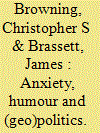

|
|
|
|
|
| Summary/Abstract |
Humour is usually overlooked in analyses of international politics, this despite its growing prevalence and circulation in an increasingly mediatised world, with this neglect also evident in the growing literature on ontological security and anxiety in IR. Humour, though, needs to be taken seriously, crossing as it does the high-low politics divide and performing a variety of functions. In the context of the Covid pandemic we argue that the link between humour and anxiety has been evident in three notable respects: (i) functioning as a (sometimes problematic) form of stress relief at the level of everyday practices of anxiety management, (ii) working to reaffirm biographical narratives of (national) community and status and (iii) most significantly for IR, as a form of anxiety geopolitics.
|
|
|
|
|
|
|
|
|
|
|
|
|
|
|
|
| 2 |
ID:
086455
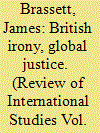

|
|
|
|
|
| Publication |
2009.
|
| Summary/Abstract |
The article provides a critical analysis of the concept of irony and how it relates to global justice. Taking Richard Rorty as a lead, it is suggested that irony can foreground a sense of doubt over our own most heartfelt beliefs regarding justice. This provides at least one ideal sense in which irony can impact the discussion of global ethics by pitching less as a discourse of grand universals and more as a set of hopeful narratives about how to reduce suffering. The article then extends this notion via the particular - and particularly - ethnocentric case of British Irony. Accepting certain difficulties with any definition of British Irony the article reads the interventions of three protagonists on the subject of global justice - Chris Brown, Banksy and Ricky Gervais. It is argued that their considerations bring to light important nuances in irony relating to the importance of playfulness, tragedy, pain, self-criticism and paradox. The position is then qualified against the (opposing) critiques that irony is either too radical, or, too conservative a quality to make a meaningful impact on the discussion of global justice. Ultimately, irony is defended as a critical and imaginative form, which can (but does not necessarily) foster a greater awareness of the possibilities and limits for thinking/doing global justice.
%''The comic frame, in making a man the student of himself, makes it possible for him to 'transcend' occasions when he has been tricked or cheated, since he can readily put such discouragements into his 'assets' column, under the heading of 'experience'. . . . In sum, the comic frame should enable people to be observers of themselves, while acting.
|
|
|
|
|
|
|
|
|
|
|
|
|
|
|
|
| 3 |
ID:
051655


|
|
|
|
|
| Publication |
Dec 2003.
|
| Summary/Abstract |
Globalisation is not what it used to be. Earlier debates over how to read the indicators of economic liberalisation and the impact of technological expansion have now been joined by the increasingly pressing need to explore the social, environmental and political aspects of global change. Earlier discussions emphasised a number of dichotomies within the international political economy - open/closed, state/market and so on. These have proved limited in their ability to inform explanations of change under conditions of globalisation. To these we must now add what we might call the 'governance from above', 'resistance from below' dichotomy as a popular metaphor for understanding order and change in international relations under conditions of globalisation. But this new binary axis is in many ways as unsatisfactory as those that went before. It too can obscure as much as it reveals in terms of understanding the normative possibilities of reforming globalisation. In this article we wish to suggest that there is perhaps a more useful way of thinking about politics and the changing contours of political life in the contemporary global order. This approach blurs the distinction between governance and resistance by emphasising an ethical take on globalisation.
|
|
|
|
|
|
|
|
|
|
|
|
|
|
|
|
| 4 |
ID:
061757
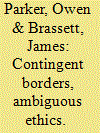

|
|
|
| 5 |
ID:
095615
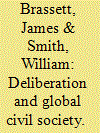

|
|
|
|
|
| Publication |
2010.
|
| Summary/Abstract |
The article provides a critical analysis of the role and function of global civil society within deliberative approaches to global governance. It critiques a common view that global civil society can/should act as an agent for democratising global governance and seeks to explore the importance of global civil society as an arena of deliberation. This more reconstructive aim is supplemented by an empirically focused discussion of the affective dimensions of global civil society, in general, and the increasingly important use of film, in particular. Ultimately, this then yields an image of the deliberative politics of global civil society that is more reflective of the differences, ambiguities and contests that pervade its discourses about global governance. This is presented as a quality that debates about deliberative global governance might learn from as well as speak to.
|
|
|
|
|
|
|
|
|
|
|
|
|
|
|
|
| 6 |
ID:
114564


|
|
|
| 7 |
ID:
111925


|
|
|
|
|
| Publication |
2012.
|
| Summary/Abstract |
The article provides a critical analysis of the performative effects of invocations of trauma and traumatic imagery during the sub-prime crisis. We develop a pragmatic approach to performativity that foregrounds the ambiguity between the importance of performative utterances, on the one hand, and overlapping performativities that produce subjects capable of "hearing" such utterances, on the other. We argue that a performative effect of the traumatic narrative of the sub-prime crisis was to constitute it as "an event" with traumatic characteristics. Financial subjects came to anticipate the object of financial salvation through intervention to save the banks; and such a view worked to curtail the range of political possibilities that were thinkable. Lines of pragmatic resistance are suggested, which turn the logic of trauma toward broadly progressive ends. In this way, the political dimension of performativity is brought forward: if finance is performative, then this only invites the question of how we might perform it differently.
|
|
|
|
|
|
|
|
|
|
|
|
|
|
|
|
| 8 |
ID:
091916
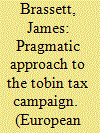

|
|
|
|
|
| Publication |
2009.
|
| Summary/Abstract |
The article provides a critical analysis of the campaign for a Tobin Tax. A popular view that global civil society can act as an agent for ethics is interrogated by appeal to the dilemmas and political contests which pervade the campaign. Problems with financial and institutional universalism undermine any unambiguous ethical appeal in the Tobin Tax by imposing a set of limits on thinkable avenues of reform. However, and drawing on the philosophical pragmatism of Richard Rorty, it is argued that the campaign can be celebrated for its role in ongoing practices of 'sentimental education'. By illustrating the harm that financial markets cause, the Tobin Tax involves larger, more diverse, audiences in a conversation about global finance; technical and sentimental discourses blur. Moreover, those very contests that pervade the campaign can act to interrupt the totalizing aspects of the proposal, thus making alternatives thinkable. Engaging the 'politics of sentimental education', in this way, allows a contingent celebration of what is ethically useful in the Tobin Tax, while leaving an area of contest that is potentially antithetical. Rather than plump for an either/ or position, the difficult, but ethical, challenge is to do both-and. The article concludes by suggesting how this 'politics of sentimental education' might bear upon existing knowledge about the theory and practice of global civil society.
|
|
|
|
|
|
|
|
|
|
|
|
|
|
|
|
| 9 |
ID:
137014


|
|
|
|
|
| Summary/Abstract |
This article critically examines the performative politics of resilience in the context of the current UK Civil Contingencies (UKCC) agenda. It places resilience within a wider politics of (in)security that seeks to govern risk by folding uncertainty into everyday practices that plan for, pre-empt, and imagine extreme events. Moving beyond existing diagnoses of resilience based either on ecological adaptation or neoliberal governmentality, we develop a performative approach that highlights the instability, contingency, and ambiguity within attempts to govern uncertainties. This performative politics of resilience is investigated via two case studies that explore 1) critical national infrastructure protection and 2) humanitarian emergency preparedness. By drawing attention to the particularities of how resilient knowledge is performed and what it does in diverse contexts, we repoliticize resilience as an ongoing, incomplete, and potentially self-undermining discourse.
|
|
|
|
|
|
|
|
|
|
|
|
|
|
|
|
| 10 |
ID:
139585
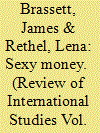

|
|
|
|
|
| Summary/Abstract |
The article develops a critical analysis of gendered narratives of global finance. The post-subprime crisis equation of unfettered global finance with the excessive masculinity of individual bankers is read in line with a wider gender narrative. We discuss how hetero-normative relations between men and women underpin financial representations through three historical examples: war bond advertising, Hollywood films about bankers, and contemporary aesthetic representations of female politicians who advocate for austerity. A politics emerges whereby gender is used to encompass a/the spectrum between embedded and disembedded finance, approximate to the divide between oikonomia and chrematistics. The apparently desirable ‘marriage’ between the state and finance that ensues carries several ambiguities – precisely along gender lines – that point to a pervasive limit: the myth of embedded liberalism in the imagination of global finance.
|
|
|
|
|
|
|
|
|
|
|
|
|
|
|
|
|
|
|
|
|